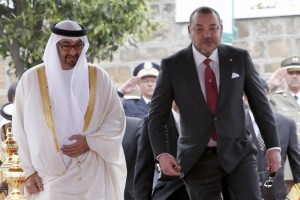US News & World Report
By Ahmed Charai
Arab nations, not the U.S., are leading the way on nonviolent approaches to crises in the region.
Seen from the Arab world, the United States’ reluctance to come to the aid of its Middle East allies is baffling and frightening. The lack of effective engagement seems especially murky when America’s Arab allies present nonviolent solutions to a trio of crises facing the region – the Syrian civil war, Iran’s nuclear build-up and the rise of the Islamic State group – to say nothing of the ongoing daily struggle against violent extremism as underscored by the terrorist attack on the Bardo National Museum in Tunisia on Wednesday.
Take U.S. policy toward Syria. The civil war is really a three-cornered regional war that has drawn in almost every fighting force in the Middle East. It is World War I, relived in the land of St. Paul. The war pits the Syrian dictator Bashar Assad, his ally Iran and its proxy force Hezbollah and Russia (Syria is its last Arab ally) against Syrian rebels (a motley crew of former Syrian soldiers, students and radicals), Saudi Arabia and Gulf Arab states. The Islamic State group is the third force, eager to establish a seventh-century empire in the ashes of Syria’s secular suburbs. The war has devoured more than 200,000 lives since 2011.
Obama initially pledged military action if Assad crossed the “red line” of using chemical weapons against his own people. When the evidence from U.N. inspectors and other international observers became too clear to deny, the White House claimed it was powerless to act. American inaction made the conflict bloodier and paved the path for the Islamic State group conquests.
The U.S. response is largely limited to providing small arms to some Syrian rebel groups that, if anything, simply prolong the conflict. If there is a strategy here, it is a deeply cynical one: entrap the Iranians and their proxies in an epic bloodletting, a kind of Vietnam War. This may drain Iran over time, but the cost will be counted in civilian lives, many of them children.
Or take U.S. dealings with Iran. Even after Iran unveiled what the regime claims is an intercontinental ballistic missile and acknowledgedthat it has 10,000 centrifuges spinning to enrich uranium, the Obama administration has continued to press for an agreement – or at least the framework to keep talks going. The Iranians actually have an expression for a deal where one side is very keen and the other disinterested: “The bowl is hotter than the soup.” And the Americans are clearly the bowl.
Few actually expect the Iranians to agree to dismantle their nuclear program or abide by any agreement that they sign. Yet the Obama administration’s talks allow them to appear to be acting while accepting an Iranian nuclear device as inevitable. Indeed, the pointless talks make the mullah’s bomb inevitable.
Finally, there is the White House’s policy toward the Islamic State group and its parade of atrocities: beheadings of American journalists, the murder of an American woman who came to do charity work in Arab lands, the immolation of a Jordanian pilot and finally using children to execute prisoners. No outrage seems to galvanize any action by the Americans. Again, this seems like a cold and cruel cynicism: Why risk the political consequences of military action when a few air strikes and sad speeches should suffice to feign action?
And, now, strangely, the Arabs are the idealists – pushing aside domestic political objections to address problems that trouble the entire region. Saudi Arabia and Israel are now exchanging intelligence on the Iranian nuclear build-up that threatens them both. Egypt’s new leader gives brave speeches against extremism and calls for an “Islamic Reformation.”
Morocco’s king, Mohammed VI, is now sending troops and equipment to the United Arab Emirates to fight terrorism. The UAE has gratefully responded with a visit by its crown prince, Mohammed bin Zayed, this week, signaling an even closer relationship between the moderate monarchies. Indeed, the two moderate nations have developed a powerful, multilayered approach to fighting terrorism that goes beyond air strikes. Mohammed VI began a few years ago by coupling internal reforms (turning the kingdom into a multiparty parliamentary democracy and modernizing the economy to create jobs for young people entering the workforce) with external outreach (sponsoring education programs for imams to emphasize “non-violence and tolerance”). The king also promotes free trade with other Arab nations to encourage job growth and deter young men from terrorism.I
The UAE is now adopting a similar approach – and has added an important new wrinkle. In the past few years, the UAE has become more aligned with the moderate approach that terrorism cannot be tolerated anywhere because soon it becomes a menace everywhere. The new idealistic approach is to pursue both killing organizations and the bogus charities that fuel them.
If America does not soon recover her idealism – her desire for a fairer, freer and more peaceful world – her friends in the region may see her as a nation prepared to watch Arabs die for some perceived political benefit. Indeed, that is a view that is already solidifying. Once America is seen as just another self-interested outsider – like China or Russia – it will no longer be trusted to convene peace talks or assemble coalitions of the willing. Its influence will be lost for a generation, maybe longer. Unless the Obama administration recovers its idealistic concern for Arab lives, the Middle East will become even more dangerous.
It could start by welcoming some of the nonviolent alternatives offered by the king of Morocco and the crown prince of the UAE.








